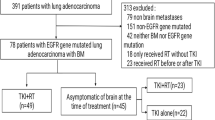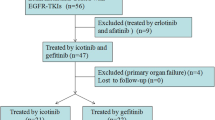Summary
This study compared the therapeutic effect of first-line epidermal growth factor receptor tyrosine kinase inhibitor (EGFR-TKI) with that of EGFR-TKI plus whole brain radiotherapy (WBRT) on patients with EGFR mutation-positive lung adenocarcinoma and brain metastases. A total of 139 patients with lung adenocarcinoma and brain metastases treated with first-line EGFRTKI therapy from September 2008 to December 2017 were enrolled in this study. The study endpoints were intracranial time to progression (TTP) and overall survival (OS). The effects of clinical pathological parameters and EGFR gene status on the study endpoints were compared. The results showed that the intracranial TTP was significantly longer in EGFR-TKI plus WBRT group than in EGFR-TKI group (median 30.0 vs.18.2 months, χ2=10.824, P=0.001), but no significant difference in the OS was noted between the two groups (median 48.0 vs. 41.1 months, χ2=0.012, P=0.912). Also, there was no statistically significant difference in the OS between patients treated with early and late radiotherapy (P=0.849) and between those with asymptomatic and those with symptomatic intracranial metastases (P=0.189). The OS and intracranial TTP of patients with intracranial oligometastases (≤3 metastatic sites) were not significantly different from those of patients with multiple intracranial metastases (P=0.104 and P=0.357, respectively), and exon 19 and exon 21 mutations didn’t show significant effects on the OS and intracranial TTP of patients (P=0.418 and P=0.386, respectively). In conclusion, there was no statistically significant difference in the OS between the EGFR-TKI alone group and EGFR-TKI plus WBRT group. However, simultaneous use of WBRT was found to significantly prolong intracranial TTP and improve cerebral symptoms, and thus EGFR-TKI and WBRT combined may be clinically beneficial for patients with EGFR mutation-positive lung adenocarcinoma and brain metastases.
Similar content being viewed by others
References
Govindan R. Overcoming resistance to targeted therapy for lung cancer. New Engl J Med, 2015,372(18):1760–1761
Garraway LA, Verweij J, Ballman KV. Precision oncology: an overview. J Clin Oncol, 2013,31(15): 1803–1805
Bhatt VR, Kedia S, Kessinger A, et al. Brain metastasis in patients with non-small-cell lung cancer and epidermal growth factor receptor mutations. J Clin Oncol, 2013,31(25):3162–3164
Heon S, Yeap BY, Britt GJ, et al. Development of central nervous system metastases in patients with advanced non-small cell lung cancer and somatic EGFR mutations treated with gefitinib or erlotinib. Clin Cancer Res, 2010,16(23):5873–5882
Yi HG, Kim HJ, Kim YJ, et al. Epidermal growth factor receptor (EGFR) tyrosine kinase inhibitors (TKIs) are effective for leptomeningeal metastasis from non-small cell lung cancer patients with sensitive EGFR mutation or other predictive factors of good response for EGFR TKI. Lung cancer, 2009,65(1):80–84
Wu YL, Zhou C, Cheng Y, et al. Erlotinib as second-line treatment in patients with advanced non-small-cell lung cancer and asymptomatic brain metastases: a phase II study (CTONG-0803). Ann Oncol. 2013,24(4):993–999
Renaud S, Schaeffer M, Voegeli AC, et al. Impact of EGFR mutations and KRAS amino acid substitution on the response to radiotherapy for brain metastasis of nonsmall-cell lung cancer. Future Oncol, 2016,12(1):59–70
Li X, Wang Y, Wang J, et al. Enhanced efficacy of AZD3759 and radiation on brain metastasis from EGFR mutant non-small cell lung cancer. Int J Cancer, 2018,143(1):212–224
Cai L, Zhu JF, Zhang XW, et al. A comparative analysis of EGFR mutation status in association with the efficacy of TKI in combination with WBRT/SRS/surgery plus chemotherapy in brain metastasis from non-small cell lung cancer. J Neurooncol, 2014,120(2):423–430
Herman MA, Tremont-Lukats I, Meyers CA, et al. Neurocognitive and functional assessment of patients with brain metastases: a pilot study. Am J Clin Oncol, 2003,26(3):273–279
Takano T, Fukui T, Ohe Y, et al. EGFR mutations predict survival benefit from gefitinib in patients with advanced lung adenocarcinoma: a historical comparison of patients treated before and after gefitinib approval in Japan. J Clin Oncol, 2008,26(34):5589–5595
Matsumoto S, Takahashi K, Iwakawa R, et al. Frequent EGFR mutations in brain metastases of lung adenocarcinoma. Int J Cancer, 2006,119(6):1491–1494
Baek MY, Ahn HK, Park KR, et al. Epidermal growth factor receptor mutation and pattern of brain metastasis in patients with non-small cell lung cancer. Korean J Intern Med, 2018,33(1):168–175
Shin SM, Cooper BT, Chachoua A, et al. Survival but not brain metastasis response relates to lung cancer mutation status after radiosurgery. J Neurooncol, 2016,126(3):483–491
Wang WL, Li HW, Cao JZ, et al. Impacts of EGFR 19 exon mutations on brain metastases in treatment-naive patients with lung adenocarcinoma. Zhonghua Zhong Liu Za Zhi (Chinese), 2017,39(10):744–748
Gerber NK, Yamada Y, Rimner A, et al. Erlotinib versus radiation therapy for brain metastases in patients with EGFR-mutant lung adenocarcinoma. Int J Radiat Oncol Biol Phys, 2014,89(2):322–329
Chinnaiyan P, Huang S, Vallabhaneni G, et al. Mechanisms of enhanced radiation response following epidermal growth factor receptor signaling inhibition by erlotinib (Tarceva). Cancer Res, 2005,65(8):3328–3335
Lu Y, Fan Y. Combined action of EGFR tyrosine kinase inhibitors and whole-brain radiotherapy on EGFRmutated non-small-cell lung cancer patients with brain metastasis. Onco Targets Ther, 2016,9:1135–1143
Chen Y, Yang J, Li X, et al. First-line epidermal growth factor receptor (EGFR)-tyrosine kinase inhibitor alone or with whole-brain radiotherapy for brain metastases in patients with EGFR-mutated lung adenocarcinoma. Cancer Sci, 2016,107(12):1800–1805
Zeng YD, Zhang L, Liao H, et al. Gefitinib alone or with concomitant whole brain radiotherapy for patients with brain metastasis from non-small-cell lung cancer: a retrospective study. Asian Pac J Cancer Prev, 2012,13(3):909–914
Byeon S, Ham JS, Sun JM, et al. Analysis of the benefit of sequential cranial radiotherapy in patients with EGFR mutant non-small cell lung cancer and brain metastasis. Med Oncol, 2016,33(8):97
Jiang T, Su C, Li X, et al. EGFR TKIs plus WBRT Demonstrated No Survival Benefit Other Than That of TKIs Alone in Patients with NSCLC and EGFR Mutation and Brain Metastases. J Thorac Oncol, 2016,11(10):1718–1728
Sung S, Lee SW, Kwak YK, et al. Intracranial control and survival outcome of tyrosine kinase inhibitor (TKI) alone versus TKI plus radiotherapy for brain metastasis of epidermal growth factor receptor-mutant non-small cell lung cancer. J Neurooncol, 2018,139(1):205–213
Johung KL, Yeh N, Desai NB, et al. Extended Survival and Prognostic Factors for Patients With ALKRearranged Non-Small-Cell Lung Cancer and Brain Metastasis. J Clin Oncol, 2016,34(2):123–129
Martinez P, Mak RH, Oxnard GR. Targeted Therapy as an Alternative to Whole-Brain Radiotherapy in EGFRMutant or ALK-Positive Non-Small-Cell Lung Cancer With Brain Metastases. JAMA Oncol, 2017,3(9):1274–1275
Wang H, Yu X, Fan Y, et al. Multiple treatment modalities for brain metastasis in patients with EGFRmutant non-small-cell lung cancer. Onco Targets Ther, 2018,11:2149–2155
Gerdan L, Segedin B, Nagy V, et al. Brain metastasis from non-small cell lung cancer (NSCLC): prognostic importance of the number of involved extracranial organs. Strahlenther Onkol, 2014,190(1):64–67
Yu JY, Yu SF, Wang SH, et al. Clinical outcomes of EGFR-TKI treatment and genetic heterogeneity in lung adenocarcinoma patients with EGFR mutations on exons 19 and 21. Chin J Cancer, 2016,35:30
Zhou J, Ben S. Comparison of therapeutic effects of EGFR-tyrosine kinase inhibitors on 19Del and L858R mutations in advanced lung adenocarcinoma and effect on cellular immune function. Thorac Cancer, 2018,9(2):228–233
Author information
Authors and Affiliations
Corresponding author
Additional information
This study was supported by the Independent Research Project of Wuhan University (No. 2042016kf0127), the Natural Science Foundation of Hubei Province (No. 2017CFB245), the Guidance Fund of Renmin Hospital of Wuhan University (No. RMYD2018M48), and the National Natural Science Foundation of China (No. U1604175).
Rights and permissions
About this article
Cite this article
Ke, Sb., Qiu, H., Chen, Jm. et al. Therapeutic Effect of First-line Epidermal Growth Factor Receptor Tyrosine Kinase Inhibitor (EGFR-TKI) Combined with Whole Brain Radiotherapy on Patients with EGFR Mutation-positive Lung Adenocarcinoma and Brain Metastases. CURR MED SCI 38, 1062–1068 (2018). https://doi.org/10.1007/s11596-018-1984-0
Received:
Revised:
Published:
Issue Date:
DOI: https://doi.org/10.1007/s11596-018-1984-0




